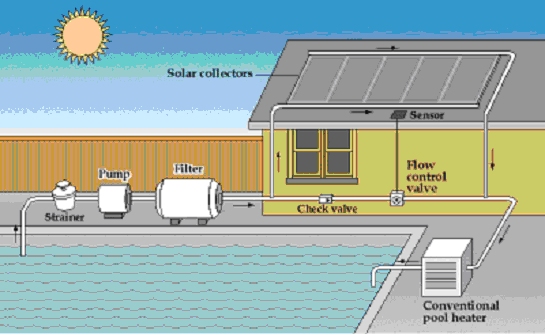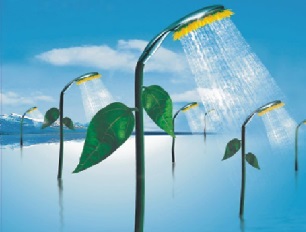Solar pool heating systems usually cost $3,000 - $4,000 to buy and install. This provides a payback of between 1.5 and 7 years, depending on local fuel costs. Solar pool heating systems also typically last longer than gas or heat pump pool heaters. Actual cost and pay-back depend on your site, type of system, financing, and length of pool season.
Often, a payback cannot be calculated when people choose not to heat pools at all, given the extra $300 to $600 on their energy bill. A solar pool heating system allows these people to swim in a pool that was previously too costly to heat and too cold to use.
Since actual cost and payback depend on many factors, before purchasing and installing a solar pool heating system, you should:
* Evaluate your site's solar resource
* Determine the correct system size
* Determine the system's efficiency
* Compare system costs
* Investigate local codes, covenants, and regulations.
Sizing a Solar Swimming Pool Heating System
Sizing a solar swimming pool heating system involves many factors. Contractors can help with this.
* Pool size
* Length of swimming season
* Average regional temperatures
* Desired pool temperature
* Site's solar resource
* Collector orientation and tilt
* Collector efficiency
* Use of a pool cover.
Basically, the surface area of your solar collector should equal 50% - 100% of the surface area of your pool. In cooler and cloudier areas, you may need to increase the ratio. Adding more collector square footage lengthens the swimming season and allows owners to use the pool in colder weather. A pool cover or blanket reduces heat loss and helps maintain warm temperatures longer.
For example, a 15-by-30-foot outdoor swimming pool in Florida typically requires a collector that equals 100% of the pool's square footage for year-round use. This equals 450 sqft of collectors. In northern California, most people use outdoor pools 6 - 8 months/year, so they typically size their systems at 60% - 70% of pool surface area.
You'll also want a properly-sized pool pump for a solar system. If you're replacing a conventional pool heating system with a solar system, you may need a pump larger than your current one or a separate, smaller pump to move the pool's water to and through the collectors.
Installation and Maintenance
Proper installation of a solar pool heating system depends on the list above of factors you need to consider. Therefore, it's best to have a qualified solar thermal systems contractor install your system.
After installation, properly maintaining your system will keep it running for 10-20 years. Consult your contractor and read your owner's manual for maintenance requirements. Your collector should require little maintenance if the pool's chemical balance and filtering system are checked regularly. Glazed collectors may need to be cleaned in dry climates where rainwater doesn't provide a natural rinse.
When screening potential contractors for installation and/or maintenance, ask the following questions:
* Does your company have experience installing and maintaining solar pool heating systems?
Choose a company that has experience installing the type of system you want and servicing the applications you select.
* How many years of experience does your company have with solar heating installation and maintenance?
The more experience the better. Request a list of past customers who can provide references.
* Is your company licensed or certified?
Having a valid plumber's and/or solar contractor's license is required in some states. Contact your city and county for more information. Confirm licensing with your state's contractor licensing board. The licensing board can also tell you about any complaints against state-licensed contractors.



